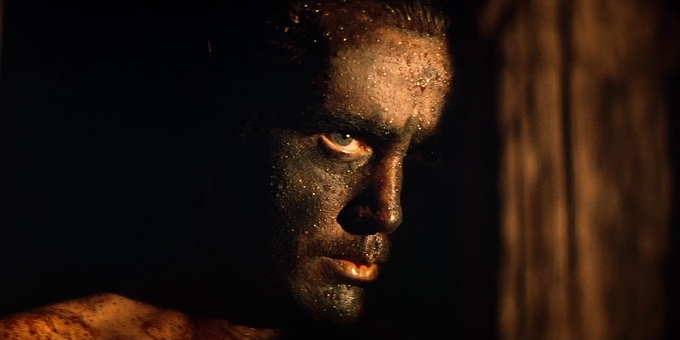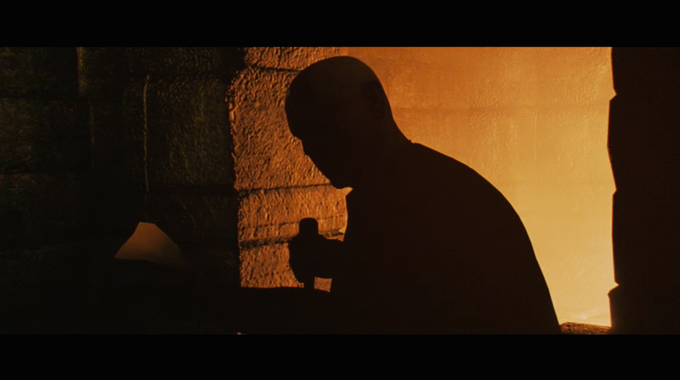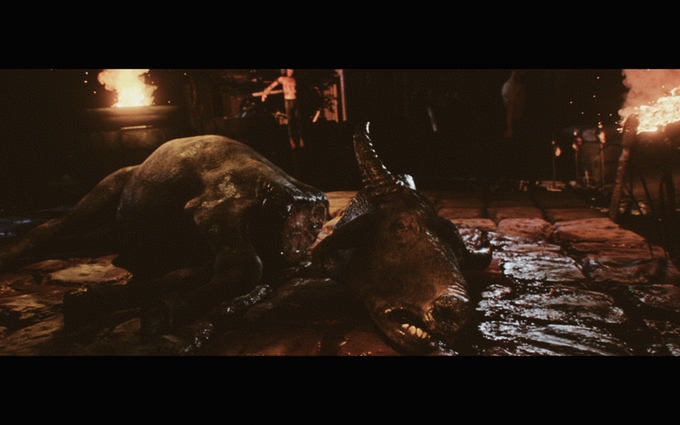Apocalypse Now is becoming a psychedelic first-person horror game
We talk to writer Rob Auten about how the team plans to translate a complex cinematic classic into a new kind of RPG.

A videogame adaptation of Francis Ford Coppola’s dark take on the Vietnam War, Apocalypse Now, is on the way—at least by around 2020 if the development team meets their Kickstarter funding goal.
It’s an announcement that will undoubtedly inspire a mixed and passionate reaction, and rightfully so. How can a videogame billed as a psychedelic first-person horror RPG adapt a dark, meditative film on the Vietnam War without coming off as hamfisted? And what can it say that already hasn’t been said by Heart of Darkness, or another game adaptation of the same source material, Spec Ops: The Line?
When I talked to lead writer on the project, Rob Auten, he assured me that he and the rest of the team are aware of how easily such an adaptation could go wrong. Without an inordinate attention to detail, the characters, from Willard to Kurtz, might behave like pizza parlor animatronic imitations of their talented Hollywood counterparts. And licensed games have a stigma as existing for the purpose of capitalizing on a namesake.
But the team is confident they’re capable, and have support from Francis Ford Coppola and American Zoetrope to back them up. Now, they just need all the educated scrutiny they can afford, which is why they’re turning to crowdfunding and bringing some serious industry talent with them.

Montgomery Markland, who led the Wasteland 2 and Torment: Tides of Numenera Kickstarter campaigns is serving as Director, and Auten has plenty of experience under his belt, penning both Gears of War: Judgement and Battlefield: Hardline. Legendary RPG designer Josh Sawyer (Fallout: New Vegas, Pillars of Eternity) is also on call as a consultant for gameplay design. Good hands, overall.
The journey upriver
Apocalypse Now is in such an early stage of development that it’s unclear exactly what those hands are working to create. So far, the team has built an early prototype that demonstrates the tone and potential angle for the rest of the game (where some of those screenshots are from), but it's far from representative of the final shape. What we do know is that it’ll be in first person from the perspective of Captain Benjamin Willard and that it will feature familiar scenes from the film, but won’t lift the structure and sequence outright. Most curious of all is how exactly the game will play.
“It's not a conventional war game in any way,” Auten told me, “It's much more driven by relationships and by tension.”
Auten isn’t too sure what the final version will look like himself, but knows that it will primarily entail systems of choice and consequence—though not in the quicktime or dialogue-choice Telltale Games sense we typically see today. Auten is hoping to settle for a simpler verb set when it comes to the player making those important decisions. “Do you use your mouth or your guns? And how does that cause the other members of the boat to feel about you?” he says.
The biggest gaming news, reviews and hardware deals
Keep up to date with the most important stories and the best deals, as picked by the PC Gamer team.
For example, during the film an encounter with another boat on the river needlessly erupts into violence. One of the boat’s crew mows down the unarmed occupants of the Vietnamese sampam until only an injured woman and a puppy remain. Willard, who the player will control, finishes her off in the film. Whether he does it to end her suffering or in solidarity with his companion’s violent impulse isn’t clear—and in the game, the player will define that motive whether they shoot her or not.
Whether you pull the trigger is up to you.
Rob Auten, Writer
"You may meet the sampam on the river, but that doesn't mean you're going to have the same interaction with Willard shooting the woman that you have in the film,” says Auten. "Whether you pull the trigger is up to you.”
By giving players the option to react to Apocalypse Now’s frequent morality plays as the central character, there’s even potential for a ‘good’ ending to the story, using Kurtz as a judge of sorts.
“We kind of see Kurtz as almost this fortune teller, this oracular figure, and he's spoken about in similar terms in the film and some of the documentation as well,” says Auten, “So, we have the ability to have a character in the end of the game that sees through you as though he knows the actions you've taken and devises an ending that really fits the way the punishment fits the crime.”
Maybe there’s a series of choices that leads to an ending with a smiling, happy, physically fit Kurtz orbited by butterflies—and that puppy from the sampam is there too, yipping and healthy. Somehow, I doubt it.
Apocalypse Now, now?
Even if Auten and company can pull off a morally sprawling adaptation of Apocalypse Now, it’s not clear why videogames are a good medium, and why 2017 was the time to get started.
Auten makes his case, comparing the potency of a virtualized Apocalypse Now with that of its original theatrical run. Dubbed the Roadshow Presentation, the film was cut without any credits sequences whatsoever. Attendees received a playbill, had a moment to read through the cast and crew, and then the movie just played—in 70mm and accompanied by the first mass market use of quintaphonic surround sound, no less. It was a powerful pairing, deploying a new technology with such a beautiful, cacophonic, and existentially charged film. Auten believes videogames lend a similar leap in immersive, immediate power.

“For me, the ability to take that sort of vibe and that energy and transpose that into an interactive one—it's obviously a really ambitious and scary prospect, but that was exactly how [Francis Ford Coppola] saw this, that was exactly what they wanted to do,” he says.
For Auten, such an advancement comes in the form of AI and fluid, evolving narratives that respond to player behaviors invisibly.
“Character and the evolution and evocation of character in computer-driven systems is something that's really interesting to me,“ says Auten, “We're less concerned about really tense machine gun set pieces and really more about characters that feel like they have both the knowledge base and a presence that’s maybe a little bit more eerie than some of the things we've seen before.”
We need a process that enables us to have an active and involved community through the development process.
Rob Auten, Writer
Advanced narrative AI sounds pie-in-the-sky, but juggling the fragile hearts of so many ardent film fans versed in both cinema and videogames means Auten and the team need to execute. They’re actively looking forward to how critical and involved their community will be, and Kickstarter was a natural fit for assembling such a jury.
“I think the community process, when you have a film such as this that so many people care about so dearly, and when you have a topic that is so often not as deftly handled as it could be as the Vietnam War, I think for us, in order to ensure our own success—we need a process that enables us to have an active and involved community through the development process.”

Despite the talent lifting it up and their open development approach, Apocalypse Now still doesn’t have a clear enough shape for me to cast aside all doubt. But the inherent absurdity and ambition of the project is more than enough for me to pay attention. Games have plenty of room to grow and experiment, even within existing frameworks whose reputations indicate otherwise. I’ll do LSD in an FPS—sure, why not?
In Call of Duty: Advanced Warfare, you press F to “pay respects” to a fallen soldier. It’s an attempt at gravitas wrapped in the same videogame mechanic used to rip a man from an armored truck and toss him into oncoming traffic.
When I ask Rob if we’ll be pressing F to ‘decapitate cattle’, he launches into a long story about a friend who spent time with the same tribes from the film in person, living among them for a while, and who witnessed the same climatic, violent ritual depicted near the climax in person. “Some pretty powerful stuff is being uncorked there,” he says, and suddenly remembers the question, laughing. “So yeah, we're going to keep away from engaging with quicktime events.”
Consider me a healthy, optimistic skeptic.
For more information on the pitch and the campaign, check out the Kickstarter page.
James is stuck in an endless loop, playing the Dark Souls games on repeat until Elden Ring and Silksong set him free. He's a truffle pig for indie horror and weird FPS games too, seeking out games that actively hurt to play. Otherwise he's wandering Austin, identifying mushrooms and doodling grackles.


